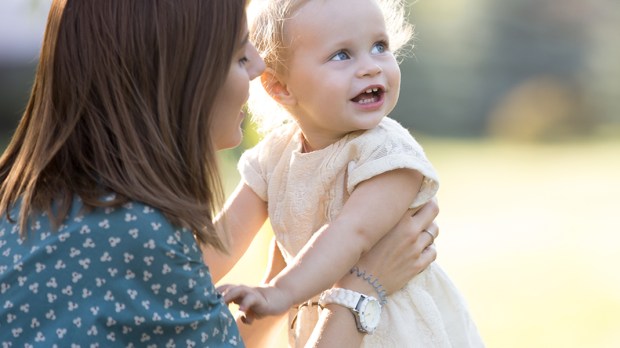When I was pregnant with my first baby, I remember being appalled at the behavior of children in the OB’s office. At the time, it seemed like something straight out of Lord of the Flies — babies chewing on hair, chairs, keys, each other; toddlers hugging, shoving, screaming, and biting; preschool-aged kids running circles around the waiting room. At least 10 times a day I would say to myself or my husband, “our kid will never do that.”
Here’s a short list of things I swore my kid would never do:
-hit me in the face
-chew on a chair
-lick a dog’s mouth
-throw a tantrum in public
-tell me “no”
-take their pants off in the grocery store
Luckily, my daughter Sienna was born ready. She accomplished that entire list before her first birthday, and earned bonus points for knocking a screen out of a window and crawling through it while I was making dinner one night. The first clue I had that she wasn’t playing with her toys in the baby-proofed room where I had left her was when I answered the doorbell to see our neighbor standing there with Sienna on his hip.
Read more:
Which Battles Are Worth Fighting With Teens?
“Did you misplace something?” he said with a chuckle. Turns out he had seen the whole thing unfold and knew I wasn’t being negligent, for which I was deeply grateful. But it was one more nail in the coffin of my delusion that I could control, or even predict, what my child would or would not do.
I meant it when I said I was lucky. I got to do a 180 when my kids were small, since they taught me over and over that they would, in fact, do the thing I was sure they wouldn’t do. I am so grateful that I learned that lesson early, when the stakes were low. I can’t imagine how much harder it would be to learn it in the teenage years, like the author of this post at Scary Mommy.
I said the one sentence you should never say as a parent: My kid would never do that. You see, I said it a lot because I just didn’t know any better. Or maybe I thought I knew better because life (and my children’s lack of judgment) hadn’t slapped me across the face yet, and I truly never thought it would. I mean, I’m a great mom, and great moms don’t raise kids who do stupid things. They don’t raise kids who do bad things. Ridiculous things. Things that have your face turning scarlet red whilst screaming, “What on God’s green earth were you thinking?!” kind of things. They just don’t. Great moms and dads only raise great, perfect, shame-free kids.
I already knew that great parents raise kids who do stupid things, because my parents were great and I did lots of stupid things. Things they never thought I would do, not in a million years. But I did them anyway — not because I didn’t know better, but because I was young and dumb. As the author put it so eloquently at Scary Mommy, “That is how we are able to explain free will coupled with underdeveloped brain functionality.”
What I didn’t know was how personal it can feel when your child does something you thought they’d never do. I don’t mean a baby licking a dog’s mouth — that’s nothing. I mean when your kid violates principles that are fundamental to your family — when they transgress the most sacred virtues you have tried to instill in them. It feels like a slap to the face, a sundering of trust, a rejection of your love. It feels like they did it at you.

Read more:
Why you need to start scheduling “carefree timelessness” into your day
But they didn’t, of course, which is why we should think twice before we say, “My kid would never do that.” Just like your toddler doesn’t hit you in the face to hurt you but because he’s hungry or tired or overwhelmed, your teenager doesn’t rebel out of malice. They rebel because they need to — their brains are changing and developing, and they’re testing boundaries and stretching their wings in preparation for striking out on their own.
And that’s okay. It’s not a reflection of us as parents, it’s a reflection of our children as autonomous people. They’re not extensions of us and they’ll almost certainly defy our expectations, in both good ways and bad — just like we did.

